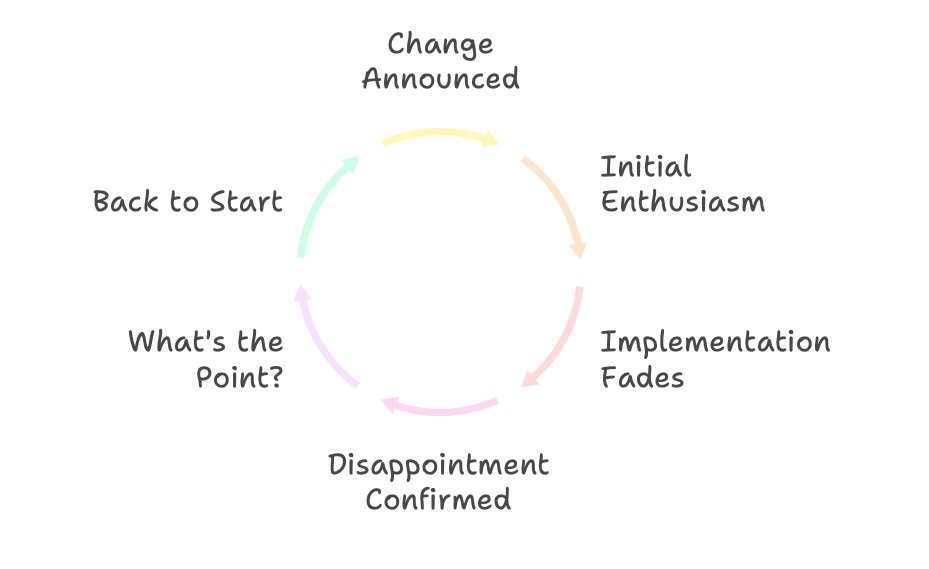Three Words That Signal Real Trouble…
In every workplace, three words quietly kill progress: “What’s the point?” They don’t come from negativity — they come from disappointment. Here’s how one comment in a workshop revealed the true state of a company’s culture — and what it took to turn it around.
Steve Simpson
10/13/20253 min read


There's a moment in every change initiative that tells you everything you need to know about your organisation's capacity for transformation. For me, it came during a workshop on Unwritten Ground Rules (UGRs) when someone muttered something I couldn't quite hear.
I stopped. "Sorry, did you want to say something for all of us to hear? If not, no problem."
He paused, then decided to speak up: "What's the point? I've been here many years and it's all talk and no change."
The Most Honest Thing Said All Day
I thanked him. Not because it was comfortable to hear, but because he had just articulated the most powerful UGR in the room—possibly the most powerful in the entire organisation.
His three words weren't cynicism. They were accumulated evidence. A conclusion drawn from repeated experience. A survival mechanism that whispers, "Don't invest your hope here. You'll only be disappointed again."
And here's what makes this UGR so insidious: if it's widely held, it becomes a self-fulfilling prophecy.
How "What's the Point?" Becomes True
When enough people believe that change initiatives are performative theatre, something remarkable happens:
People stop contributing their best ideas
Implementation becomes half-hearted compliance
Innovation dies in the gap between announcement and action
Leaders mistake silence for agreement
The prophecy fulfils itself
The organisation doesn't fail to change because change is impossible. It fails to change because the collective belief system won't allow it. The UGR becomes the operating system that runs silently in the background, executing its program perfectly: Initiate change process. Generate initial enthusiasm. Wait for inevitable disappointment. Confirm belief. Repeat.
Why This Matters More Than Your Strategy
You can have the most brilliant change strategy in the world. You can hire expensive consultants. You can create detailed roadmaps and compelling PowerPoints. None of it matters if your people are silently asking, "What's the point?"
Because UGRs—those unspoken rules that actually govern behaviour—will always trump the official rules printed in your handbook or announced in your town halls.
The question isn't whether your organisation has this UGR. The question is: How would you know if it did?
Here's the uncomfortable truth: Most leaders wouldn't know. Because people with this belief don't broadcast it in meetings. They've learned that speaking up is itself pointless. So it stays underground, shaping behaviour while remaining invisible to those who most need to see it.
What Almost Stayed Silent
That moment in the workshop could have gone differently. If I hadn't stopped and invited him to share properly, that UGR would have remained in the shadows—muttered under breath, shared in hallway conversations, but never brought into the light where it could be addressed.
How many of your change initiatives are running into invisible resistance that no one's naming?
When I gave him the space to speak without pressure ("if not, no problem"), he chose to voice what many were likely thinking. That choice to surface the UGR was the beginning of being able to address it.
Because the first step in changing a UGR is making it visible. You can't address what remains unspoken.
The Path Forward Starts With Listening
If "What's the point?" is operating in your organisation, here's what helps:
Acknowledge the history. Don't gaslight people by pretending previous initiatives succeeded when everyone knows they didn't. The credibility you lose trying to rewrite history isn't worth the temporary comfort.
Create space for honest dialogue. Ask people to share their UGRs about change. Listen without defensiveness. The patterns that emerge will tell you everything you need to know about what's really blocking progress.
Start small and finish completely. The antidote to "all talk and no change" is disciplined execution of smaller commitments. One fully implemented change does more to shift a UGR than ten announced initiatives that fade away.
Make the change in how you change. If the UGR is "change initiatives don't lead to real change," then you can't use the same approach and expect different results. The meta-change has to come first.
The Gift of Being Invited to Speak
Looking back, that moment was pivotal—not because of what was said, but because it was almost not said at all. The real UGR wasn't just "What's the point?" It was "Don't bother speaking up because no one's really listening."
By pausing, by noticing something was said, by inviting him to share without pressure, we created a tiny opening. And through that opening came the truth that the whole room needed to hear.
The most dangerous version of this UGR isn't when someone mutters it under their breath. It's when everyone thinks it and no one even tries to say it anymore.
So if you're leading change, pay attention to the mutterings, the side conversations, the things you almost don't hear. Create the conditions where people feel safe enough to bring those underground beliefs into the light.
Because until those UGRs surface, they're running your change initiative from the shadows. And all your plans, all your strategies, all your good intentions will keep crashing against that invisible barrier, leaving everyone to wonder—once again—what the point was.
